Low Creatinine Levels – Symptoms, Causes, And Treatments + Diet Tips
Update yourself about your kidney health and know how to take care of it the right way.

Image: Shutterstock
Creatinine is the waste product formed from the breakdown of muscle tissues every day which enters your bloodstream. Next, your kidneys filter creatinine out of your body through urine, which helps in creatinine management. But what does low creatinine mean? Since creatinine indicates kidney function and the amount of muscle in one’s body, creatinine deficiency is an indication that your kidneys or muscles are not functioning properly. For the meaning of low creatinine, Olesya Wilson, a certified nutritionist, says, “It is one of the levels measured in blood tests to determine the health of your kidneys.” The good news is there are several low creatinine levels treatments one can opt for to gain healthy creatinine reduction. The normal range of creatinine level is between 0.6 and 1.2 mg/dl for men and 0.5 to 1.1 mg/dl for women (1). Medical treatment in conjunction with changes in your diet and lifestyle can go a long way in restoring your creatinine levels to normal. To know more, in this article, we take a look at what creatinine is, some of the causes behind low creatinine levels, signs and symptoms of low creatinine, and the medical treatments you can go for. Scroll down to know more!
In This Article
What Is Creatinine – A Brief
Creatinine is a chemical waste compound produced from the natural wear and tear of muscles in the body. It originates from creatine, a naturally found chemical in the body that is crucial for energy production. Over time, creatine gets converted into creatinine, which then travels through the bloodstream to the kidneys. The kidneys filter out creatinine, relieving it from the body via urine.
Elevated blood creatinine levels typically indicate impaired kidney function or kidney disease. Normal levels of creatinine in the blood can slightly vary based on factors such as age, gender, and muscle mass. Regular monitoring of creatinine levels helps medical professionals diagnose and manage kidney-related health issues.
With an idea of creatinine, let us discuss some of the symptoms and causes of low creatinine in the next section.
Key Takeaways
- Low creatinine levels indicate improper functioning of kidneys and muscles.
- Causes of low creatinine levels range from muscle and liver diseases to dehydration.
- Its symptoms include muscle weakness, jaundice, swelling, pain, and reduced movement of muscles.
- It is diagnosed through tests like serum creatinine test and urine test.
- To treat low creatinine levels, you could take corticosteroids or strengthen muscle mass through physical activities and strengthening exercises.
- Consume a diet rich in protein and avoid alcohol to improve creatinine levels.
Symptoms And Causes Of Low Creatinine
Low levels of creatinine can be a symptom of muscle loss, aging, severe liver disease, an extremely low-protein diet, or pregnancy. It is crucial to consult a healthcare professional so that the right course of action can be taken.
Low creatinine levels can indicate impaired kidney function. Some common symptoms of low creatinine include:
- Fatigue and weakness
- Loss of appetite
- Nausea and vomiting
- Swelling in the legs and ankles
- Shortness of breath
- Muscle weakness
- Jaundice
- Abdominal swelling and pain
- Dehydration-related symptoms

One needs to know when to worry about low creatinine levels and what causes low creatinine! The signs and symptoms of low creatinine levels are usually associated with an underlying medical condition. They include:
- Muscle diseases like muscular dystrophyi A class of genetic disorders that result in gradual muscle loss and weakening, as well as difficulty in breathing and swallowing. can lead to symptoms like muscle weakness, stiffened muscles, pain, and reduced movement.
- Liver diseases or poor functioning of the liver can also interfere with the production of creatine, thereby causing low creatinine levels. This may lead to symptoms like jaundice, abdominal swelling and pain, swelling, and pale/tar-colored/bloody stool.
- Low creatinine levels can also be caused due to loss of water from your body (dehydration). This could either be due to an excess of water intake, pregnancy, or even due to certain medications.
 Quick Tip
Quick TipAs you already know, the breakdown of muscle tissues produces creatinine. Therefore, low levels of this chemical waste (creatinine) could be an indication of low muscle mass – a risk factor for low creatinine levels.
Malnutrition and a low-protein or low-meat diet are some of the common causes of low muscle mass (3).
In such cases, it is crucial to know how to raise creatinine levels. To determine whether you require improvement in your creatinine levels, and for overall renal health maintenance, your doctor or healthcare provider may employ multiple diagnostic tests.
Diagnosis
Wilson says, “Creatinine levels can be measured using a blood or urine test. “Low” creatinine in this context would be its concentration in relation to albumin, a protein in the blood. If albumin levels are high in relation to “low” creatinine levels, this is a symptom of kidney disease or diabetes.”
One of the options to determine your creatinine levels is a serum creatinine test that can help measure the creatinine levels in your bloodstream.
Another option is a creatinine urine test that will test your urine to determine your creatinine levels.
Once the diagnostic test reveals your creatinine levels, your doctor will suggest a creatinine support treatment plan. Low creatinine levels may need further diagnostic tests to rule out a muscular disease (if any). A muscle biopsyi A medical procedure in which tissue from a specific muscle is taken and examined under a microscope to identify any abnormalities. or a muscle enzyme test may be conducted to look for muscle damage.
Once the cause of your low creatinine levels is determined, your doctor will discuss the treatment options available to treat your condition.
Medical Treatments
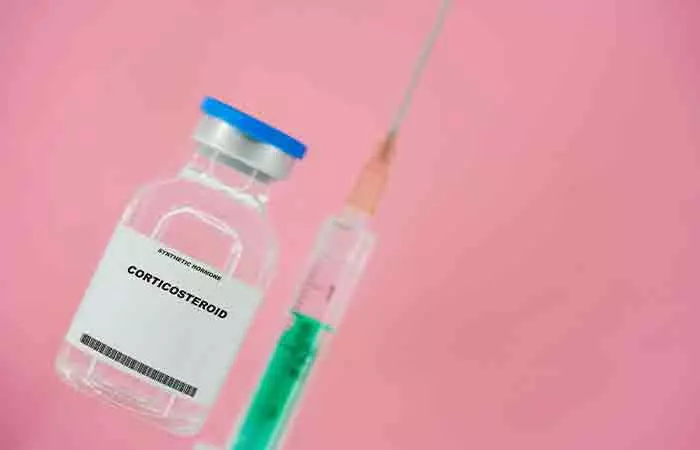
If you are found to have an underlying muscle disease, your treatment will be focused on combating the condition and alleviating its symptoms. Some of the options to treat muscle diseases include taking corticosteroidsi A set of steroid hormones found in the adrenal cortex or produced synthetically that have metabolic and anti-inflammatory properties. that can help in strengthening your muscles or therapy to improve the quality of your remaining life (4).
Low creatinine levels that occur due to pregnancy are usually normalized after delivery.
If your low creatinine levels are not due to an underlying muscle disease, medical intervention may not be necessary.
Other Treatment Options
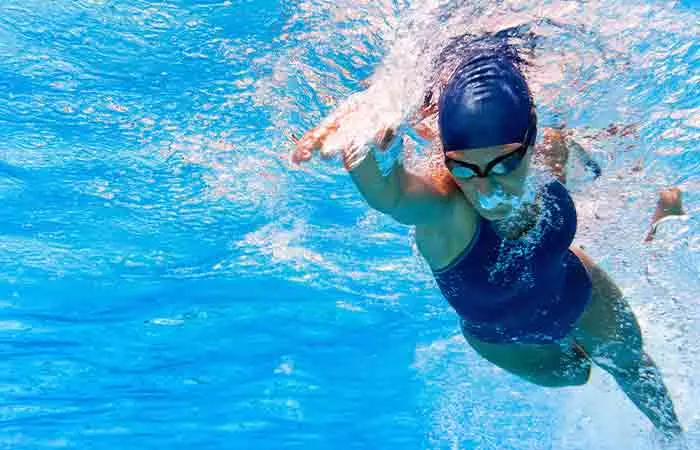
If the low creatinine levels are not a result of muscle disease, your doctor may recommend a few ways that can help in increasing and strengthening your muscle mass to normalize your creatinine levels without medications.
They may ask you to increase your level of physical activity or do strength training exercises regularly to increase your muscle mass.
You can also try:
- Walking
- Swimming
- Aerobics
- Biking
- Weightlifting
If your doctor doubts that your low muscle mass is a result of malnutrition or extreme weight loss or dieting, you may be asked to modify your diet to rebuild the lost muscles. Listed below are some diet tips that can help increase your creatinine levels by increasing your muscle mass.
Diet For Low Creatinine Levels

Start by eating 5-6 small but healthy meals daily. Your diet must consist of protein-rich foods like lean meat, seafood, milk, cheese, yogurt, cottage cheese, and soy. Vegetarians are more likely to be protein-deficient that non-vegetarians. Hence, they should consume alternative sources of protein to make up for it. Avoid alcohol as it can accelerate muscle loss (5).
Kathy, a blogger, shared her experience of having low creatinine levels and what she did to rectify the issue. She explains, “In April of 2021, my creatinine level was 0.23! Yes, that is excessively low. In July of 2021, I did another test for a heavy metal detox, and my creatinine level had increased to 7.2. I had to perform another test one month later, and my creatinine had jumped to 18.2, almost in the normal range. This is actually astounding that my levels jumped so drastically. I attribute this to a lot of hard work and can only hope that the ozone water and green juice will help support the continued improvement (i).”
You can also practice some muscle-building exercises to improve your muscle mass.
Note: You may begin creatinine supplementation (like creatine monohydrate) to improve creatinine levels in your body. Good creatinine levels help enhance athletic performance, keep your muscles and bones healthy as your age, and improve brain health.
 Quick Tip
Quick TipExercises To Improve Low Muscle Mass

Some exercises that can help improve muscle mass are (6):
- Lifting weights
- Squats
- Lunges
- Pull-ups
- Pulldowns
- Military press
- Seated dumbbell press
- Bench press
- Leg raises
- Weighted abdominal crunches
While some of these exercises, like squats and lunges, can be done right at home, you may need to go to a gym to do the others.
Here are some tips that can help prevent muscle loss.
Prevention Tips
- Follow a healthy diet that contains important nutrients, like vitamin D.
- Workout regularly.
- Get sufficient sleep.
- Don’t cut down on your carbohydrate intake.
- Limit your alcohol intake.
- Drink enough water to prevent dehydration.
Infographic: 4 Reasons Why Your Creatinine Levels May Be Low
Low creatinine levels can cause troubles for the body, so it is important to take measures to get it back up to its optimum. The sure fire way to do that is to first identify what’s causing the dip in the levels ensuring renal function optimization. Check out the infographic for an overview of the most common causes of low creatinine levels. Illustration: StyleCraze Design Team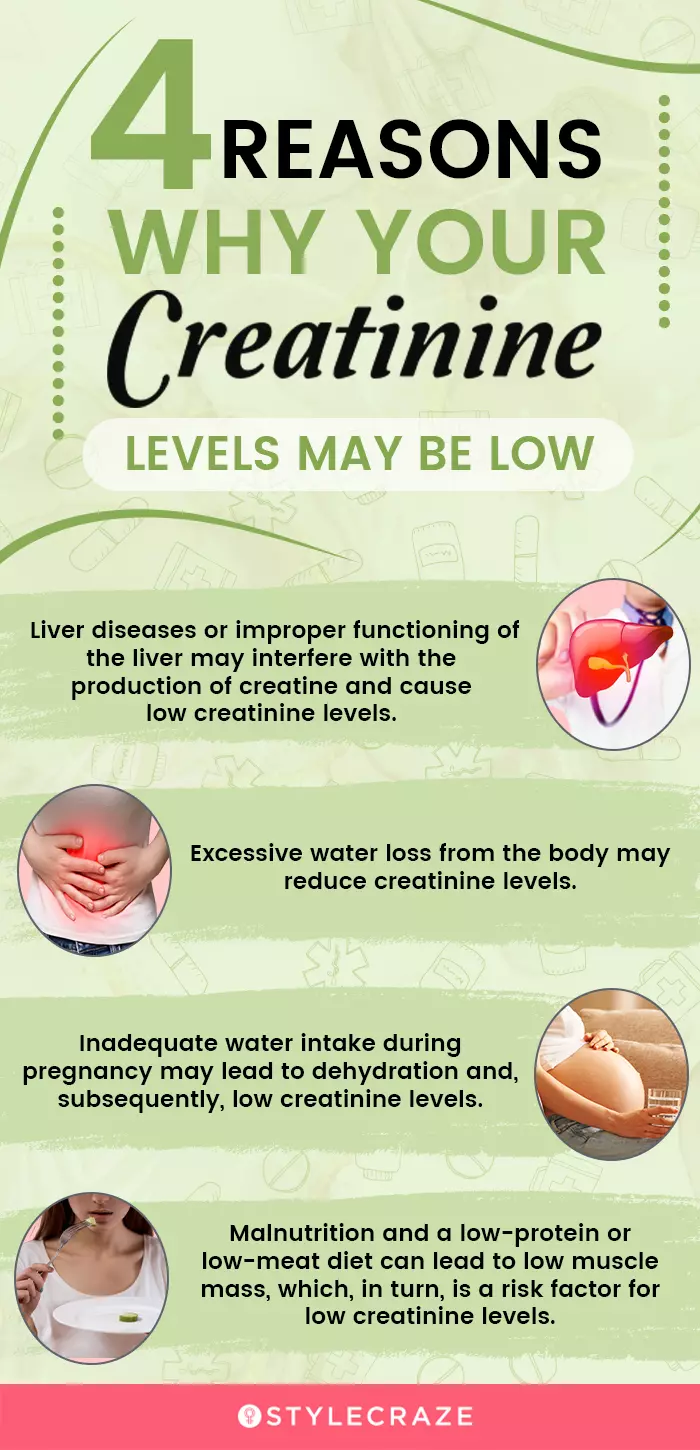
Low creatinine levels treatment helps restore the normal amount of creatinine present in the body. Muscle, liver diseases, and water loss may trigger low creatinine levels. Some medical treatments are taking corticosteroids to strengthen muscles or strength training to improve muscle mass. Diet changes like eating 5-6 small meals in a day, including protein-rich foods, and avoiding alcohol consumption combats low creatinine levels. Additionally, exercises like lunges, squats, pull-ups, pull-downs, and leg raises greatly help. Maintaining a healthy lifestyle and diet helps in managing the low creatinine levels in blood or body!
Frequently Asked Questions
What is the creatinine level for kidney failure?
The normal serum creatinine levels are supposed to be 0.5-1.1 mg/dl in women, and 0.6-1.2 mg/dl in men. Higher creatinine levels could be an indication of kidney damage.
Is a creatinine level of 1.2 bad?
A serum creatinine level of 1.2 mg/dl is clinically insignificant.
What is the best thing to drink for your kidneys?
Water is one of the best drinks for kidney function improvement. Other drinks include fruit juices like cranberry juice and lemon juice that can help in detoxifying your kidneys, preventing the formation of kidney stones, resulting in kidney health enhancement.
What does low creatinine indicate?
Low levels of creatinine may indicate muscle loss or an underlying medical condition like muscular dystrophy.
Is egg good for creatinine?
If you are concerned about your creatinine levels, avoid eating eggs because they are high in protein.
Is chicken high in creatinine?
Yes, chicken is a rich source of natural creatine.
Illustration: Low Creatinine Levels – Symptoms Causes And Treatments + Diet Tips
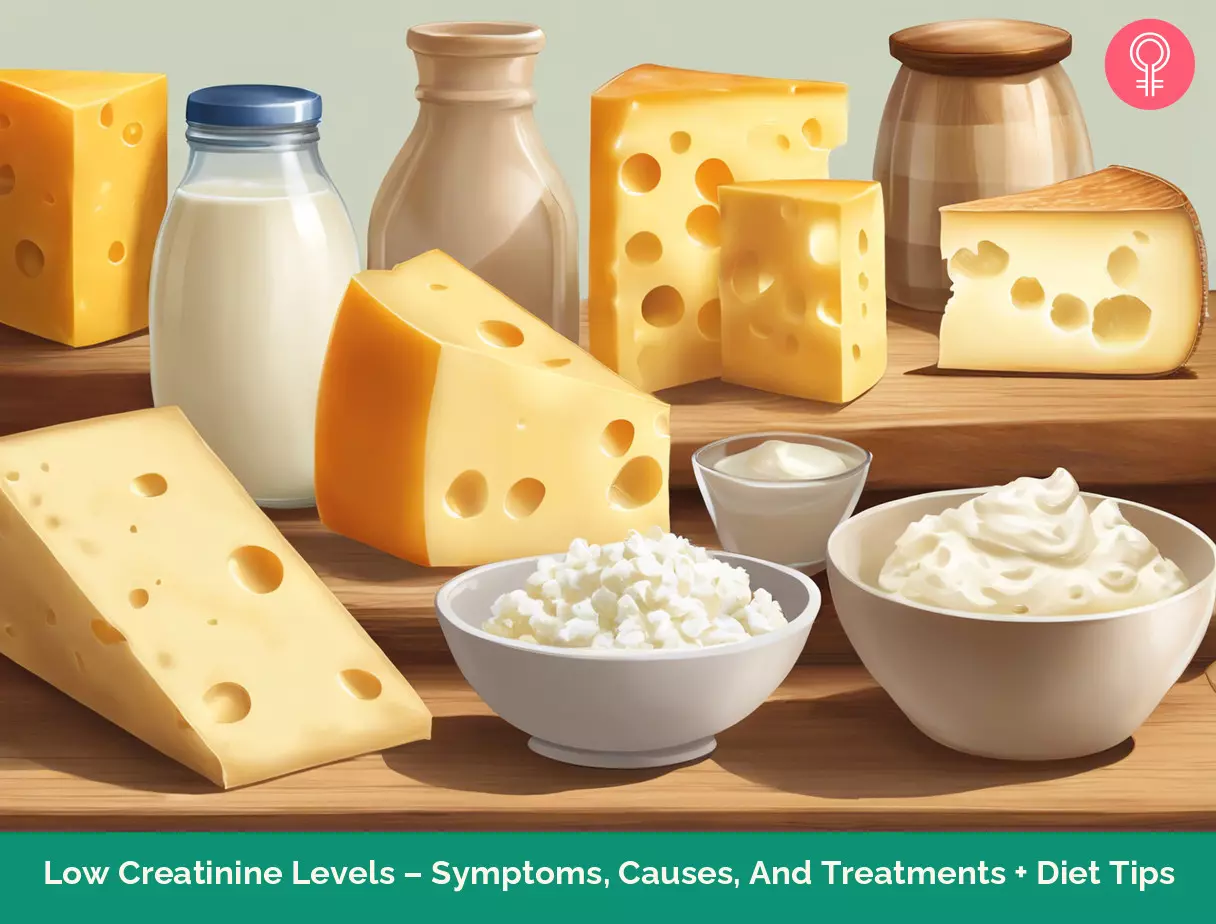
Image: Stable Diffusion/StyleCraze Design Team
Curious about the reasons behind low creatinine levels? Explore the possible causes, from dehydration to kidney issues, in this informative video. Check it out now!
Personal Experience: Source
StyleCraze's articles are interwoven with authentic personal narratives that provide depth and resonance to our content. Below are the sources of the personal accounts referenced in this article.
i. The Pink Suithttps://gritandgracewithals.wordpress.com/2021/09/05/the-pink-suit/
References
Articles on StyleCraze are backed by verified information from peer-reviewed and academic research papers, reputed organizations, research institutions, and medical associations to ensure accuracy and relevance. Read our editorial policy to learn more.
- Hosten, Adrian O. “BUN and Creatinine.” Clinical Methods: The History, Physical, and Laboratory Examinations. 3rd Edition., U.S. National Library of Medicine, 1 Jan. 1990.
www.ncbi.nlm.nih.gov/books/NBK305/ - F Berglund, J Killander, R Pompeius. “Effect of trimethoprim-sulfamethoxazole on the renal excretion of creatinine in man.” The Journal Of Urology., U.S. National Library of Medicine, Dec. 1975.
https://pubmed.ncbi.nlm.nih.gov/1195454/ - Yildiz, Abdulmecit, and Fatih Tufan. “Lower creatinine as a marker of malnutrition and lower muscle mass in hemodialysis patients.” Clinical Interventions in aging 10 1593.
https://www.ncbi.nlm.nih.gov/pmc/articles/PMC4599048/ - Hanada, Masatoshi et al. “Effect of long-term treatment with corticosteroids on skeletal muscle strength, functional exercise capacity and health status in patients with interstitial lung disease.” Respirology (Carlton, Vic.) 21,6 (2016): 1088-93.
https://pubmed.ncbi.nlm.nih.gov/27173103/ - Vargas, Roberto, and Charles H Lang. “Alcohol accelerates loss of muscle and impairs recovery of muscle mass resulting from disuse atrophy.” Alcoholism, Clinical and Experimental Research 32,1 (2008): 128-37.
https://pubmed.ncbi.nlm.nih.gov/18028527/ - Tipton, Kevin D, and Arny A Ferrando. “Improving muscle mass: response of muscle metabolism to exercise, nutrition and anabolic agents.” Essays in Biochemistry 44 (2008): 85-98.
https://pubmed.ncbi.nlm.nih.gov/18384284/
Read full bio of Dr. Sudhansu Singh
- Olesya Wilson is a Certified Nutritionist, Functional Diagnostic Practitioner, and Psychosomatics and Energy Healer. She has a unique approach to solve her client's health issues, which involves the integration of the latest discoveries in biological science, cutting-edge research, ancient herbal medicine, and revolutionary psychosomatic and energy healing practices.
 Olesya Wilson is a Certified Nutritionist, Functional Diagnostic Practitioner, and Psychosomatics and Energy Healer. She has a unique approach to solve her client's health issues, which involves the integration of the latest discoveries in biological science, cutting-edge research, ancient herbal medicine, and revolutionary psychosomatic and energy healing practices.
Olesya Wilson is a Certified Nutritionist, Functional Diagnostic Practitioner, and Psychosomatics and Energy Healer. She has a unique approach to solve her client's health issues, which involves the integration of the latest discoveries in biological science, cutting-edge research, ancient herbal medicine, and revolutionary psychosomatic and energy healing practices.
Read full bio of Shaheen Naser
Read full bio of Arshiya Syeda
Read full bio of Dipti Sharma











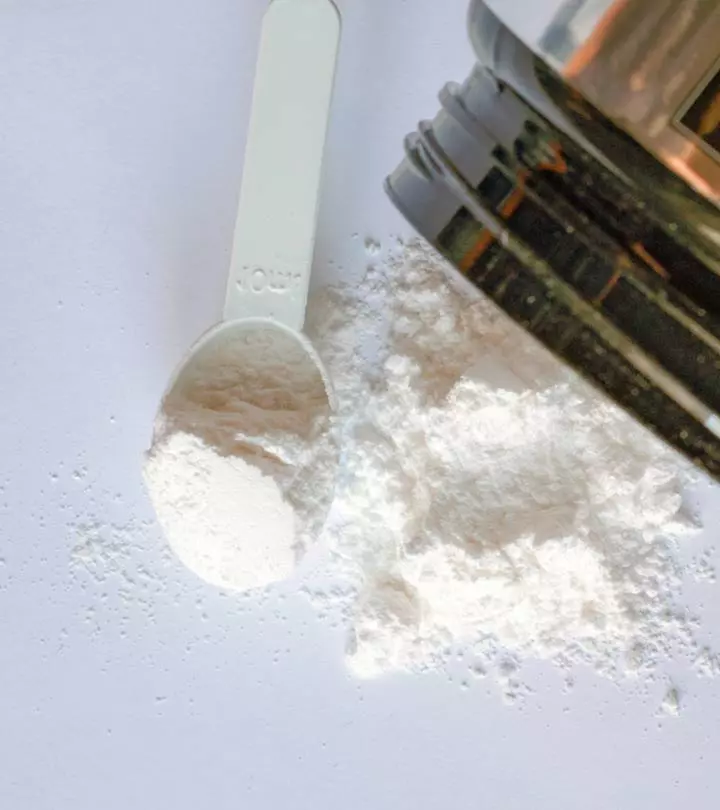


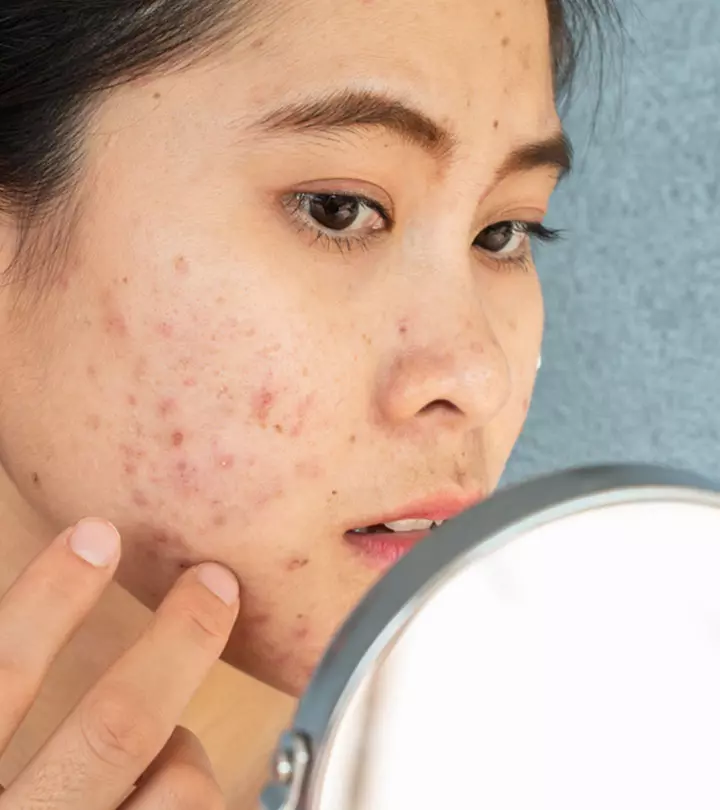
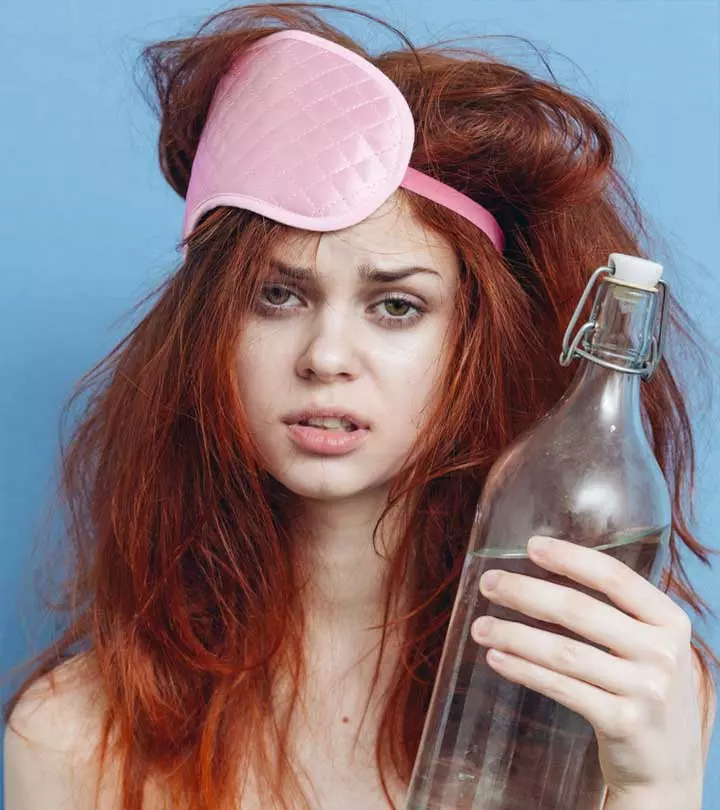


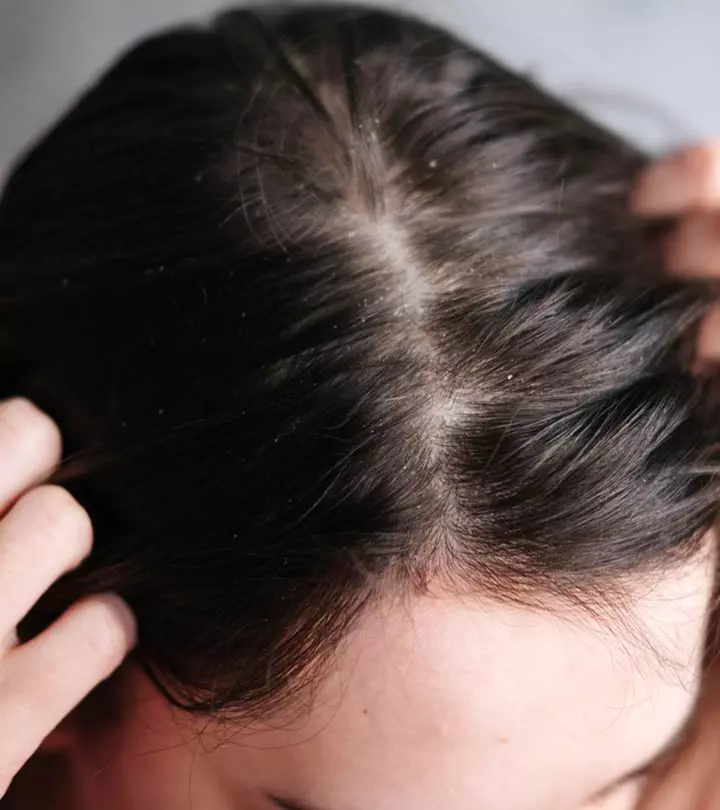

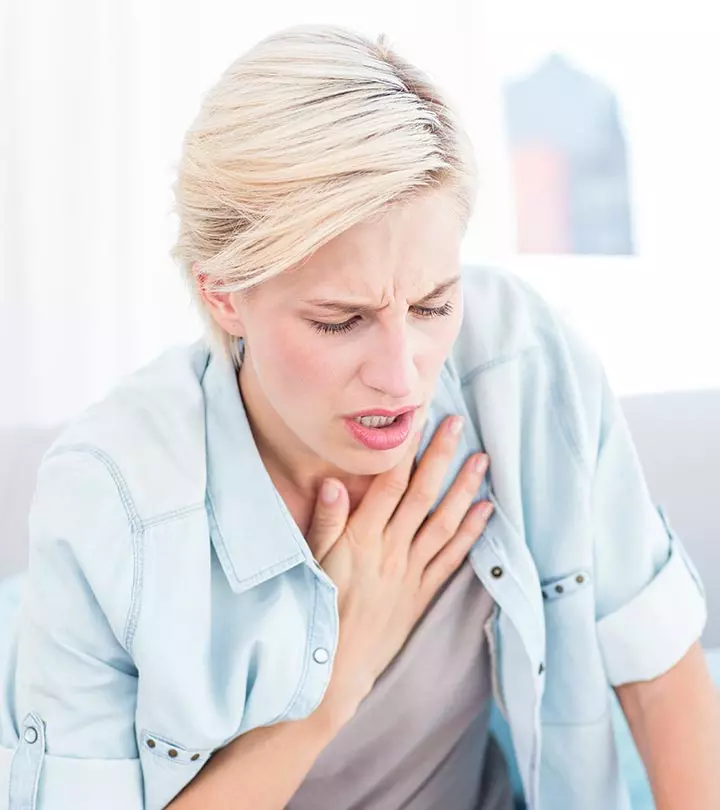



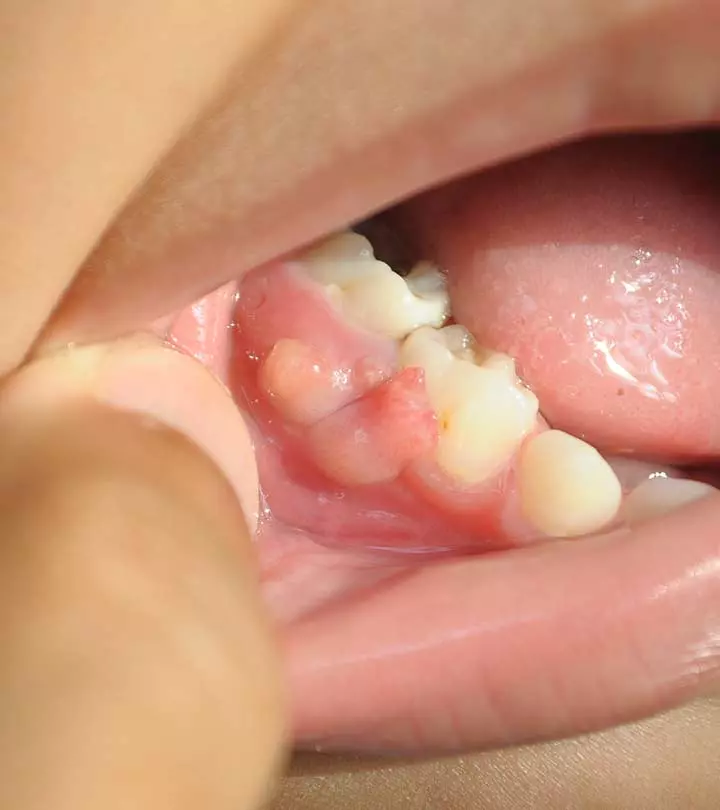


Community Experiences
Join the conversation and become a part of our empowering community! Share your stories, experiences, and insights to connect with other beauty, lifestyle, and health enthusiasts.